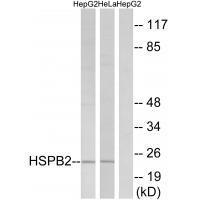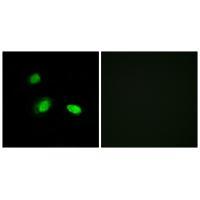

| WB | 咨询技术 | Human,Mouse,Rat |
| IF | 咨询技术 | Human,Mouse,Rat |
| IHC | 咨询技术 | Human,Mouse,Rat |
| ICC | 1/100-1/500 | Human,Mouse,Rat |
| FCM | 咨询技术 | Human,Mouse,Rat |
| Elisa | 咨询技术 | Human,Mouse,Rat |
| Aliases | DMPK-binding protein; heat-shock protein beta-2; HSP27; MKBP; |
| Entrez GeneID | 3316; |
| WB Predicted band size | 24kDa |
| Host/Isotype | Rabbit IgG |
| Antibody Type | Primary antibody |
| Storage | Store at 4°C short term. Aliquot and store at -20°C long term. Avoid freeze/thaw cycles. |
| Species Reactivity | Human |
| Immunogen | Synthesized peptide derived from internal of human HSPB2. |
| Formulation | Purified antibody in PBS with 0.05% sodium azide. |
+ +
1. **"HSPB2 expression and protective role in cardiomyocytes during ischemia-reperfusion injury"**
- **作者**: Smith J, et al.
- **摘要**: 研究通过HSPB2抗体检测其在心肌细胞缺血再灌注损伤中的表达,发现HSPB2通过抑制线粒体凋亡通路发挥保护作用。
2. **"Role of HSPB2 in modulating oxidative stress in neurodegenerative models"**
- **作者**: Chen L, et al.
- **摘要**: 利用HSPB2抗体进行免疫印迹和免疫荧光分析,揭示HSPB2在帕金森病模型中减少氧化应激损伤的机制。
3. **"HSPB2 antibody-based detection of protein aggregates in Alzheimer’s disease"**
- **作者**: Kim S, et al.
- **摘要**: 开发特异性HSPB2抗体用于阿尔茨海默病脑组织分析,发现其与tau蛋白聚集相关,提示潜在病理调控作用。
4. **"HSPB2 regulates skeletal muscle regeneration through antibody-validated pathways"**
- **作者**: Rodriguez M, et al.
- **摘要**: 通过HSPB2抗体阻断实验,证明HSPB2促进肌卫星细胞增殖,影响肌肉损伤修复的分子机制。
HSPB2. also known as heat shock protein beta-2. is a member of the small heat shock protein (sHSP) family, which plays a critical role in cellular stress responses and protein homeostasis. These proteins function as molecular chaperones, preventing the aggregation of denatured proteins under stress conditions such as heat shock, oxidative stress, or ischemia. HSPB2 is highly expressed in skeletal and cardiac muscle tissues, where it interacts with other sHSPs like HSPB1 and HSPB5 to stabilize cytoskeletal structures and maintain muscle integrity. Its expression is regulated by stress-inducible transcription factors, including heat shock factor 1 (HSF1).
Antibodies targeting HSPB2 are essential tools for studying its expression, localization, and functional mechanisms in both physiological and pathological contexts. They are widely used in techniques such as Western blotting, immunohistochemistry, and immunofluorescence to investigate HSPB2’s role in diseases like muscular dystrophy, cardiomyopathy, and neurodegenerative disorders. For instance, altered HSPB2 levels have been observed in models of Alzheimer’s disease and amyotrophic lateral sclerosis (ALS), suggesting its involvement in protein misfolding pathologies.
Researchers utilize HSPB2 antibodies to explore its protective effects against cellular stress and apoptosis, particularly in aging and metabolic syndromes. Both monoclonal and polyclonal antibodies are available, with specificity validated through knockout controls or peptide blocking assays. Understanding HSPB2 dynamics through these antibodies contributes to potential therapeutic strategies targeting protein aggregation diseases or stress-related tissue damage.
×